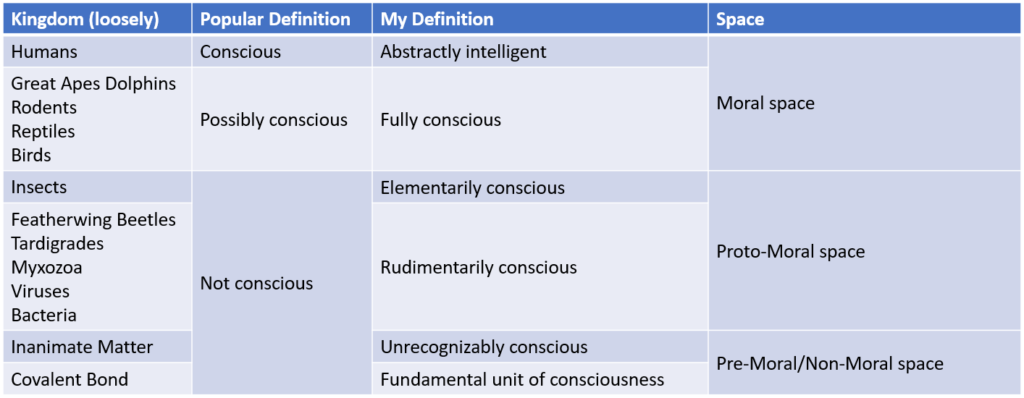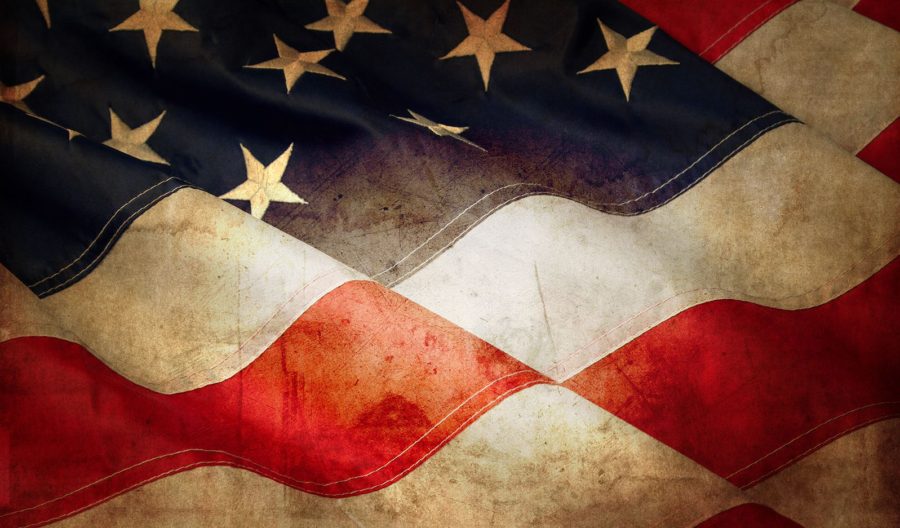God, as I define God, is before the beginning of this universe. Morality, in the proto-form that will eventually apply to us humans, doesn’t begin until living cells begin. Above the level of the single cell, and not under, there is a spectrum of relationships that we tend to call moral. Therefore, morality doesn’t start with God. Morality necessarily analyzes events in terms of distinguishing help from harm. God exists in help and harm equally. Therefore, morality doesn’t start with God. Morality is the style by which we categorize behaviors and motivations that present themselves during the interaction between at least two fully conscious agents. The God I define is the God of conscious material and not conscious material equally. God exists in the moral decision of brother vs sister as much as he exists in the non-moral space of a rock falling down a hill. Morality starts when complex consciousness emerges.
I think of God as the infinite origin of things. If you understand the concept of nothing, truly nothing, then you understand that nothing can come from nothing. You would thereby also understand that in order for there to be anything, there must first be something. You can quickly regress the origin of that something into infinity. I refer to that infinity as God. This conception has no conflict with objective falsifiable scientific truths, nor will it, and it is showing itself to me to be intellectually honest. To be sure, this is not a conception of an interventionist God that listens to prayers and occasionally answers them. This is not a conception of God supposing to completely understand his/hers/its essence as an entity. I respect the “God is not” idea. Human concepts are necessarily limited by human biology. We cannot perceive or conceive of anything more than our wetware will allow. Since our wetware is unarguably a result of greater primordial processes and our invocation of the idea of God is an attempt at conceptualizing the origin of those processes, it stands to reason that whatever the truth about God’s essence actually is, in its fullness, it must be well beyond anything we can perceive, conceive of, or articulate. The phrase ‘God as the infinite origin of things’ articulates an idea that points towards God’s essence as best I can at the moment. Don’t confuse the finger and the moon. Here I mean infinite as everything you can perceive, everything you can’t perceive, everything that exists, and everything that doesn’t. Add all that up and you get a small fraction of God, to be poetic. God is an idea, the personified infinite from which creation comes. When I say “God” this is what I’m saying and most people seem to understand.
Are stars moral? When the proto-moon collided with the proto-Earth, was it being an asshole? No. Inanimate matter is not moral nor can the consequences of the action of inanimate matter be deemed moral. If a box falls off a ledge and bruises your elbow, you would be unreasonable to claim that that box had “behaved” immorally. Boxes don’t behave at all, in a non ironic sense. Morality begins with behavior. Morality began with cellular animation, at the very least. Is a sugar molecule moral? Does it bestow it’s life affirming properties upon you from its inner generosity? No. One could argue that a sugar molecule suspended in solution spinning and moving as it does is animated but that’s not the level of animation on which I rest morality as a concept. I’m arguing that the core mechanic of morality, as we practice it, happens at least at the cellular level. Of course, there are many, many complex intervening factors for the moral behavior of humans but we can imagine a simple case in which low level recent genetic expression might be meaningful.
Let’s say there are two bacteria under water within a few micrometers of each other. One has a propeller, the other does not. The motile cell is at rest when a sugar molecule collides with its right side, the direction of a presumed concentration of sugar. Simultaneously, the motile cell has some waste product ready to be released on its left side, where the other stationary cell is. If the motile cell propels towards the concentration of sugar then releases its waste, it will do no harm to the other cell. If it releases its waste then propels towards the concentration sugar it will do grievous harm to the other cell. There is a race condition here. Will the food chase or will the waste release happen first? That depends on the internal constitution of the bacterium at that moment. Have any relevant proteins been silenced? Are there mutations that might slow one of these molecular cascades more than the other? The order of actions for this motile cell can be described as a proto-moral proto-choice. Which order of actions manifest are entirely dependent upon the internal molecular constitution of the organism at the time. That circumstance doesn’t negate the phenomenon of choice, that circumstance is the phenomenon of choice. The same principle applies to humans, which exist in the fully moral space above the proto-moral space. (See Table Below)

Let’s describe a similar human scenario. Fatima is standing next to Bruce. She has an urge to walk onto the patio and grab a doughnut. She also has an urge to fart. Bruce is helplessly looking at his phone. Bruce has a reputation for farting at socially inappropriate times and Bruce’s crush is currently walking over to talk to him. Fatima has never, to anyone’s knowledge, farted at a socially inappropriate time. Bruce recently told Fatima’s boyfriend to dump her and referred to her as a liar. Fatima knows about the details of that exchange. If she farted and walked away, no one would believe it wasn’t Bruce. No matter the intensity of his protestation to the contrary. Will Fatima exact revenge? Will Fatima abide by her better angels? The sequence of her actions is entirely dependent upon her internal molecular constitution at that moment. Is she upset about something else that she could take out on Bruce? Is she well fed, well rested, and up to the challenge of taking the high road? Those are questions about the physical status of every neuron and glial cell in Fatima’s brain. If 100 cells happen to be particularly sensitive to inhibition at that moment, she’ll give into an impulse that she might usually resist. If in this case the impulse was “Just let it go silently, wait a beat, and run away!”, the cheese can consider itself cut. These descriptions are meant to illustrate the necessary internal complexity gap between what I’m calling moral space and proto-moral space. A fully moral system has one fundamental relationship; that between at least two fully conscious agents. God is present in the the stars that made the elements that made the RNA that made us. God, in this universe, got started way before any meaningful application of the concept of morality came into play. Morality does not start with God.
Many people imagine God as something outside of this reality. Akin to an inventor controlling his drone via remote. I imagine God as both sculptor and clay. God exists in every carbon atom. This means that God exists in every neuron in your brain. This means that God is present when you selflessly sacrifice your comfort for the benefit of another and God is present when you gleefully discharge your deepest perversion onto a undeserving victim of your choosing. One can argue that this concept of God is too nebulous to be meaningful. But I would counter that by saying that this concept of God is, and will remain, intellectually consistent with modern science and mathematic discovery. Also, when this understanding is adopted by two or more people it points them in the same transcendent direction. I think those two features make it a meaningful conception indeed. One might ask why evoking God is necessary at all since we refuse to go against the findings of scientific discovery? It is my belief, emphasize belief, that the psychologically active concept of God is what allows the human mind and the human species to positively coevolve. This conception of God does not allow for moral relativism because it points towards our common genetic make up and relies on what scientific inquiry has shown, and will continue to show, us about the way we actually behave. Not the way we wish we would behave, not the way we believe we behave, but the way we actually behave as dictated by the physical constitution of our internal states. Careful measurement and analysis of human behavior will illuminate the transcendent morality that God has installed in us.
Every human being has the capacity for moral behavior. Exactly how that behavior manifests is a result of that person’s specific genetics and upbringing. The capacity for morality is akin to the capacity for language. Arabic doesn’t sound like Mandarin but neither is Jibberish. Moral behavior is similar in this way. When you look at the basic human moral code, we already find overlap, e.g. help if you can but at least do no harm and the golden rule. We have to determine what outcomes are “helpful” and “harmful” in each situation but the underlying understanding is already in place. I’m arguing that that underlying understanding has been inherited from Lucy and her ancestors. My moral north star, and from what I’ve seen that of many others, is more thriving humanity. I draw that as an implicit message from the behavior of genetic material in its primordial environment. RNA copied itself and resisted destruction. The RNA molecules that resisted destruction better than their neighbors were disproportionately represented in the subsequent generation of acids. RNA can’t articulate the meaning of its existence nor express its subjectively felt purpose but we can glean those characteristics about the molecule from its measured action in the world. Humans copy themselves and resist destruction. This principle of behavior seems like more than a tautology to me. We should expand to the moon, expand to Mars, and expand through the entire solar system. Why not? That adventurous endeavor feels positively moral.



